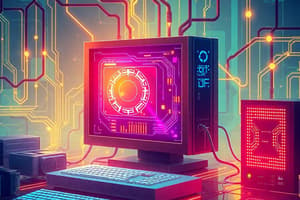Podcast
Questions and Answers
What is the primary focus of digital literacy?
What is the primary focus of digital literacy?
- Information searching and evaluation (correct)
- Basic computer skills
- Network architecture
- Computer system design
What is the primary function of a transaction processing system (TPS)?
What is the primary function of a transaction processing system (TPS)?
- To manage organizational information
- To support business decisions
- To process daily transactions (correct)
- To provide expert advice
What is the primary purpose of a router in a network?
What is the primary purpose of a router in a network?
- To direct data traffic between networks (correct)
- To manage network protocols
- To provide network security
- To connect devices to the internet
What is the primary component of an information system that stores data?
What is the primary component of an information system that stores data?
What is the primary benefit of digital literacy in modern society?
What is the primary benefit of digital literacy in modern society?
What is the primary type of network that connects devices in a limited geographical area?
What is the primary type of network that connects devices in a limited geographical area?
What is the primary function of a Central Processing Unit (CPU) in a computer system?
What is the primary function of a Central Processing Unit (CPU) in a computer system?
What type of network connects devices in a limited geographical area, such as a home or office building?
What type of network connects devices in a limited geographical area, such as a home or office building?
What is the primary goal of User Experience (UX) design in multimedia design?
What is the primary goal of User Experience (UX) design in multimedia design?
What type of software provides a platform for running application software?
What type of software provides a platform for running application software?
What is the term for a network that connects devices over a larger geographical area, such as a city or region?
What is the term for a network that connects devices over a larger geographical area, such as a city or region?
What is the process of creating a rough, preliminary version of a multimedia product called?
What is the process of creating a rough, preliminary version of a multimedia product called?
Flashcards are hidden until you start studying
Study Notes
Digital Literacy
- Definition: The ability to effectively use digital technologies to find, evaluate, and create information
- Key skills:
- Basic computer skills (e.g. typing, mouse navigation)
- Online safety and security
- Information searching and evaluation
- Digital content creation (e.g. text, images, videos)
- Communication and collaboration tools (e.g. email, social media)
- Importance: Essential for participation in modern society, education, and workforce
Information Systems
- Definition: A set of components for collecting, storing, and disseminating information
- Components:
- Hardware (e.g. computers, servers, printers)
- Software (e.g. operating systems, applications)
- Data (e.g. files, databases)
- People (e.g. users, administrators)
- Procedures (e.g. rules, protocols)
- Types:
- Transaction processing systems (TPS)
- Management information systems (MIS)
- Decision support systems (DSS)
- Expert systems (ES)
Networking Fundamentals
- Definition: The process of connecting devices to share resources and exchange data
- Key concepts:
- Network topologies (e.g. LAN, WAN, Wi-Fi)
- Network protocols (e.g. TCP/IP, HTTP)
- Network devices (e.g. routers, switches, modems)
- Network architecture (e.g. client-server, peer-to-peer)
- Network types:
- Local area network (LAN)
- Wide area network (WAN)
- Metropolitan area network (MAN)
- Wireless network (WLAN)
Computer Systems
- Definition: A set of hardware and software components that work together to process, store, and communicate information
- Hardware components:
- Central processing unit (CPU)
- Memory (RAM, ROM)
- Storage devices (e.g. hard drives, solid state drives)
- Input/output devices (e.g. keyboard, mouse, monitor)
- Software components:
- Operating system (e.g. Windows, macOS, Linux)
- Application software (e.g. productivity software, games)
- Utility software (e.g. antivirus, disk formatting)
Multimedia Design
- Definition: The process of creating interactive multimedia products using various media formats
- Key concepts:
- Multimedia elements:
- Text
- Images
- Audio
- Video
- Design principles:
- Balance
- Contrast
- Emphasis
- Movement
- Storyboarding and prototyping
- User experience (UX) design
- Multimedia elements:
- Multimedia applications:
- Educational software
- Games
- Simulations
- Virtual reality (VR) and augmented reality (AR)
Studying That Suits You
Use AI to generate personalized quizzes and flashcards to suit your learning preferences.




